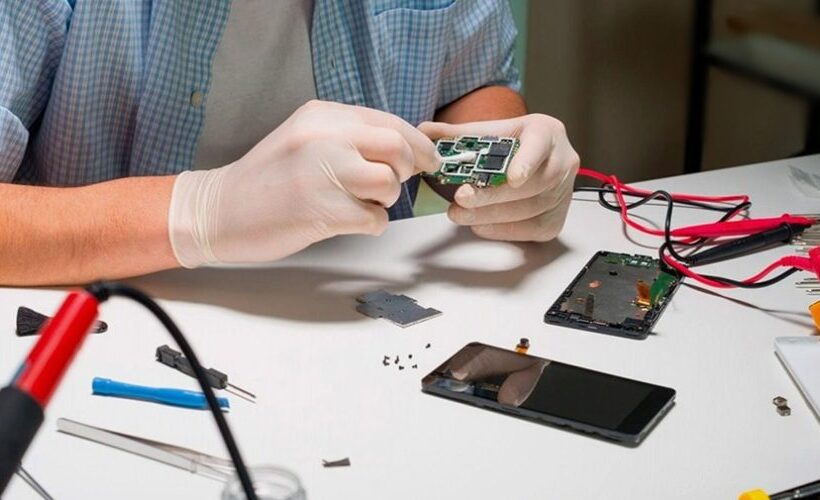
Home appliances play a big role in our daily routines, making tasks like cooking, cleaning, and storing food much easier. When something goes wrong, like a refrigerator not cooling or a washing machine not draining, it can disrupt your entire day. It’s easy to feel frustrated when these essential devices break down, but there’s no need to panic.
Even high-quality appliances can have problems and need appliance repair or maintenance over time. While some problems can be fixed with a simple DIY approach, more complicated problems might need a professional. In this article, we’ll offer tips for troubleshooting common appliance issues and advise you on when to call for expert refrigerator repair and other appliance repair services.
Common Appliance Problems and Solutions
Identifying the source of an issue is the first step to resolving it. Below are some of the most frequent problems homeowners face with their appliances and how appliance repair can help address them.
Refrigerator Repair: Keeping Your Food Fresh
Refrigerators are crucial home appliances. When they break down, your food can spoil, and you might waste groceries. Here are some common problems with refrigerators and how appliance repair can help.
- Cooling Problems: If your refrigerator isn’t cooling properly, first check the thermostat to make sure it’s set correctly. Dirty condenser coils can also cause cooling issues. Unplug the fridge and clean the coils, which are usually located at the back or underneath.
- Water Leaks: If you see water leaking, it may be because of a blocked defrost drain or a clogged water line. Look for any blockages in the drain and clear them out.
- Noisy Operation: Loud noises might mean there’s a problem with the evaporator fan or condenser motor. Try cleaning the fan blades or checking for any loose parts.
If these simple fixes don’t solve the problem, you might need to call a professional for refrigerator repair. For high-end models like Sub-Zero refrigerators, you might need to specialize in Sub Zero refrigerator repair services to handle more complex issues.
Stubborn Stoves and Ovens: When Cooking Comes to a Halt
A stove that refuses to heat up or burners that don’t ignite can bring your meal prep to a standstill. The good news is that many stove issues have straightforward fixes.
- Gas Burners Not Igniting: This could be due to clogged burner ports. Cleaning the burner ports with a small brush can usually resolve the issue. Be sure to check that the gas valve is fully open and that the gas is flowing properly.
- Electric Burners Not Heating: If an electric burner isn’t heating up, the element might be faulty and need replacing. Try swapping the non-working burner with one that functions to see if the issue lies with the burner itself or the socket.
- Oven Not Heating to Correct Temperature: If your oven isn’t heating as it should, a broken thermostat or heating element could be to blame. While some oven repair tasks can be handled independently, more complex issues should be left to a professional technician to ensure safety.
Washing Machine Woes: When Laundry Piles Up
A malfunctioning washing machine can disrupt your household routine. From improper draining to unusual noises, washing machines can develop several issues over time.
- Water Not Draining: If your washing machine isn’t draining properly, most likely the culprit is a clogged drain hose or a malfunctioning pump. Check the drain hose for blockages, and make sure it is connected properly.
- Unbalanced Loads: If your machine refuses to spin, an unbalanced load may be the issue. Rearrange the laundry evenly in the drum and try again.
- Strange Noises: Unusual sounds during operation can indicate problems with the motor or drum. If the noise persists after checking for loose items in the machine, it may be time to consult a professional.
DIY Troubleshooting Tips
Before you call a professional for appliance repair, there are a few simple steps you can try to fix small problems on your own.
Refrigerator Repair Checklist
- Check Power: Ensure that the refrigerator is plugged in and that the breaker hasn’t tripped.
- Inspect the Thermostat: Make sure the thermostat is set at the correct temperature. Sometimes, accidentally bumping the dial can lead to improper cooling.
- Clean the Condenser Coils: Dirty coils can make your refrigerator cool less effectively. You can unplug your fridge and use a vacuum or brush to clean the coils.
Range, Stove Top, and Oven Repair Checklist
- Test the Burners: Swap a non-working burner with one that works. If the replacement burner works, the issue likely lies with the original burner.
- Clean the Igniter: For gas stoves, gently clean the igniter using a toothbrush to remove dirt and debris.
- Check the Gas Supply: Ensure the gas supply is open and flowing properly.
Washing Machine Repair Checklist
- Balance the Load: If the washing machine doesn’t spin, the load might be uneven. Try moving the clothes around in the drum and then start the cycle again.
- Clean the Filter: A clogged filter can prevent the washing machine from draining. Locate and clean the filter, typically found near the base of the machine.
- Inspect the Hoses: Make sure the water hoses are securely attached and not kinked.
When to Call a Professional for Appliance Repair
You can often fix some appliance problems yourself, but for more complicated issues, it’s better to call a professional. This is especially true for tricky jobs like refrigerator repair. Knowing when to get professional appliance repair can save you time, money, and a lot of stress.
Safety Concerns
Suppose your appliance has problems with electrical parts, gas lines, or complex mechanical parts. In that case, it’s best to call a certified technician for appliance repair. Trying to solve these issues on your own can be dangerous and might cause even more problems. For example, if you need refrigerator repair and you don’t know what you’re doing, you could end up making things worse. Also, if someone isn’t qualified for repairs, you might lose any warranty on the appliance. Suppose you’re not sure how to safely handle any appliance repair. In that case, it’s always safer to let a professional take care of it.
Complex Repairs
For more intricate issues, such as those involving advanced circuitry or high-tech components, it’s important to call in an experienced appliance repair technician. This is particularly true for modern appliances with digital displays and other sophisticated features that require specialized knowledge.
Refrigerator Repair by Experts
Refrigerators, especially expensive models, have complicated systems that need expert care. For example, if the compressor has a problem, it’s important to let a trained technician handle it to prevent more damage. Getting professional refrigerator repair makes sure the issue is found and fixed the right way, helping your fridge last longer.
Finding the Right Appliance Repair Service
When the time comes to call in an expert, finding the right appliance repair service is crucial. Follow these tips to ensure you get the best service for your needs:
- Read Reviews: Online reviews can help you learn more about how good and trustworthy a local repair service is.
- Check for Certification: Ensure the technicians are certified to work on your specific appliance brand.
- Inquire About Warranties: Ask about warranty coverage for both parts and labor to protect yourself from future costs.
- Get Multiple Quotes: Don’t hesitate to askDon’testimates from multiple companies to avoid unexpected costs.
Keep Your Appliances Running Smoothly
Home appliances are vital for everyday convenience, but when they malfunction, they can cause major disruptions. By following these tips for appliance repair, including troubleshooting steps for refrigerator repair, you can resolve many common issues on your own. However, for more complex problems or safety concerns, always call in a professional. With the right care and timely maintenance, your home appliances will continue serving you efficiently for years to come.

